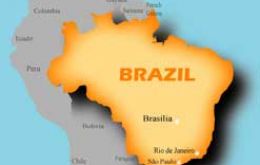MercoPress. South Atlantic News Agency
Economy
-
Monday, December 22nd 2008 - 20:00 UTC
EC warns about temptation of protectionism

European Commission president Jose Manuel Barroso admitted that the current global financial downturn implies a growing risk of increasing protectionism and other forms of limits to migratory and economic policies.
-
Monday, December 22nd 2008 - 20:00 UTC
Brazil has injected 164 billion US dollars to prop economy

The Brazilian government has injected an estimated 164 billion US dollars, mostly to banks and corporations, since the beginning of the financial downturn, according to the official news agency.
-
Monday, December 22nd 2008 - 20:00 UTC
Spanish companies secure Gibraltar PW contracts
Chief Minister Peter Caruana has declared that the Gibraltar Government has adjudicated public works contracts to Spanish companies worth an estimated 200 million Euros.
Mr Caruana was speaking at a meeting of Costa del Sol socialists in Malaga where he was the guest of Spain's former Secretary of State for Foreign Affairs Bernardino Leon, widely credited with being one of the intellectual instigators of the (UK, Spain, Gibraltar) Tripartite Forum. -
Monday, December 22nd 2008 - 20:00 UTC
Rolls-Royce awarded engine contract for Sea King helicopters
Rolls-Royce has been awarded a £258 million engine contract for the UK's fleet of Royal Navy and Royal Air Force Sea King helicopters over the next 10 years. One of them is permanently based in the Falkland Islands.
-
Monday, December 22nd 2008 - 20:00 UTC
China reacts to negative Nov: fifth rate cut in 3 months
China cut interest rates for a fifth time in three months on Monday in its latest efforts to rev up the economy. The one-year lending rate will drop by 0.27 percentage points to 5.31% and the deposit rate by the same amount to 2.25%, the People's Bank of China said on its Web site.
-
Sunday, December 21st 2008 - 20:00 UTC
Latam's six year sustained growth grinds to a halt
After six years of strong performance, Latin American and Caribbean economies will slow considerably next year as the global economic meltdown takes its toll on the region and unemployment rises, a United Nations agency for economic development announced last Friday.
-
Sunday, December 21st 2008 - 20:00 UTC
UK ministers consider £ 500 million loan to Jaguar Land Rover

The British cabinet is weighing up a direct loan worth hundreds of millions of pounds to ailing car maker Jaguar Land Rover it was reported over the weekend in the London press. Business Secretary Lord Mandelson could approve a £500 million loan to the company, which employs around 15,000 people in the UK, the Sunday Times claimed.
-
Saturday, December 20th 2008 - 20:00 UTC
Big Three rescue loan brings relief but is no handout
Citing imminent danger to the US economy, President Bush ordered Friday an emergency bailout of the US auto industry Friday, offering 17.4 billion USD in rescue loans and demanding tough concessions from the deeply troubled carmakers and their workers.
-
Saturday, December 20th 2008 - 20:00 UTC
Brazilian beef exports in November drop by 33%
Brazil beef exports dropped 33% during November following a significant contraction in global demand because of the world recession, according to the industry.
-
Saturday, December 20th 2008 - 20:00 UTC
Global contraction in 2009, first time in decades says IIF
The global economy likely will contract next year for the first time in decades as the credit crunch bites, according to the Institute of International Finance (IIF), a Washington-based association representing more than 375 of the world's major banks and financial institutions.
